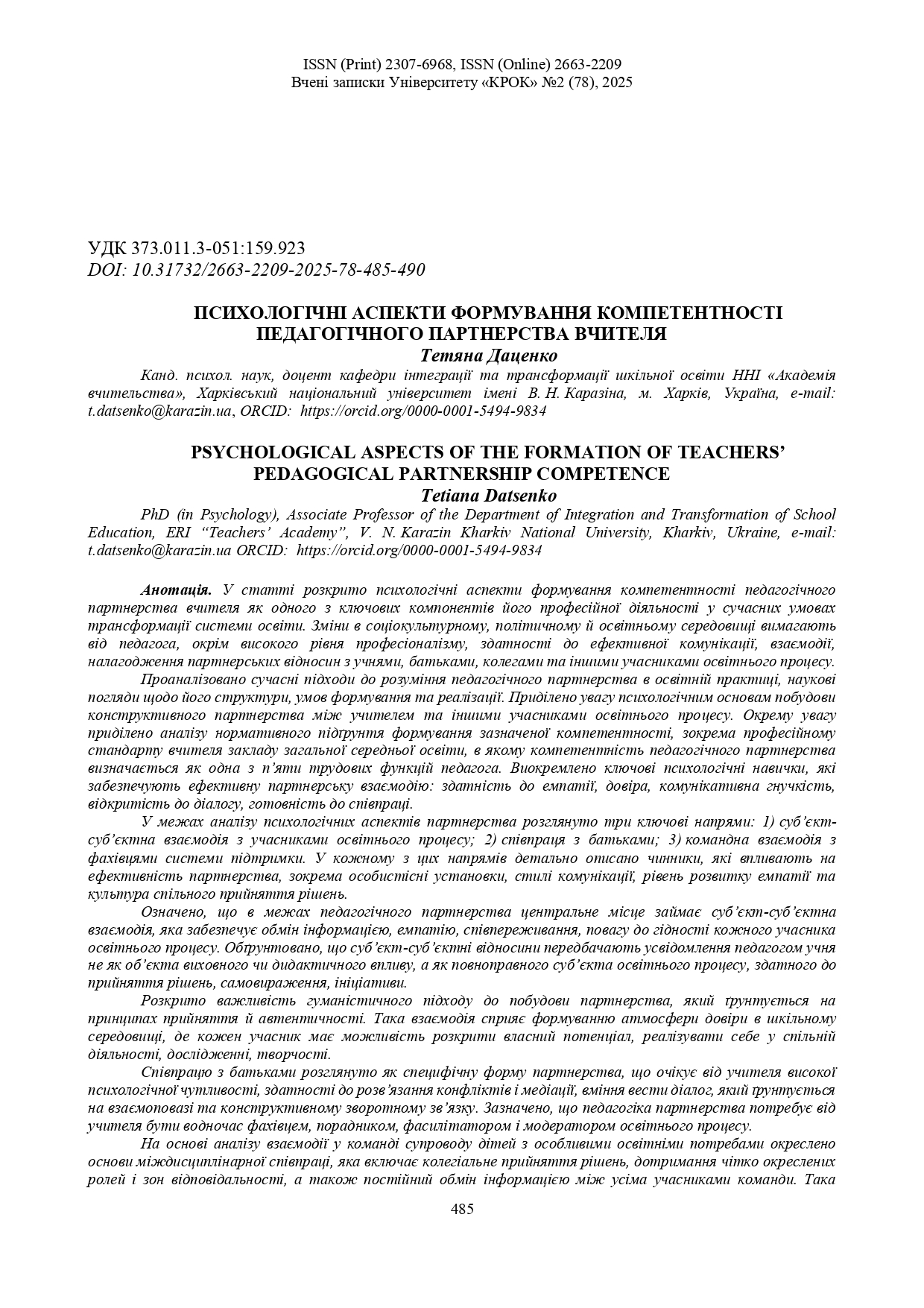ПСИХОЛОГІЧНІ АСПЕКТИ ФОРМУВАННЯ КОМПЕТЕНТНОСТІ ПЕДАГОГІЧНОГО ПАРТНЕРСТВА ВЧИТЕЛЯ
DOI:
https://doi.org/10.31732/2663-2209-2025-78-485-490Ключові слова:
компетентність педагогічного партнерства, суб’єкт-суб’єктна взаємодія,, професійний стандарт вчителяАнотація
У статті розкрито психологічні аспекти формування компетентності педагогічного партнерства вчителя як одного з ключових компонентів його професійної діяльності у сучасних умовах трансформації системи освіти. Зміни в соціокультурному, політичному й освітньому середовищі вимагають від педагога, окрім високого рівня професіоналізму, здатності до ефективної комунікації, взаємодії, налагодження партнерських відносин з учнями, батьками, колегами та іншими учасниками освітнього процесу.
Проаналізовано сучасні підходи до розуміння педагогічного партнерства в освітній практиці, наукові погляди щодо його структури, умов формування та реалізації. Приділено увагу психологічним основам побудови конструктивного партнерства між учителем та іншими учасниками освітнього процесу. Окрему увагу приділено аналізу нормативного підґрунтя формування зазначеної компетентності, зокрема професійному стандарту вчителя закладу загальної середньої освіти, в якому компетентність педагогічного партнерства визначається як одна з п’яти трудових функцій педагога. Виокремлено ключові психологічні навички, які забезпечують ефективну партнерську взаємодію: здатність до емпатії, довіра, комунікативна гнучкість, відкритість до діалогу, готовність до співпраці.
У межах аналізу психологічних аспектів партнерства розглянуто три ключові напрями: 1) суб’єкт-суб’єктна взаємодія з учасниками освітнього процесу; 2) співпраця з батьками; 3) командна взаємодія з фахівцями системи підтримки. У кожному з цих напрямів детально описано чинники, які впливають на ефективність партнерства, зокрема особистісні установки, стилі комунікації, рівень розвитку емпатії та культура спільного прийняття рішень.
Означено, що в межах педагогічного партнерства центральне місце займає суб’єкт-суб’єктна взаємодія, яка забезпечує обмін інформацією, емпатію, співпереживання, повагу до гідності кожного учасника освітнього процесу. Обґрунтовано, що суб’єкт-суб’єктні відносини передбачають усвідомлення педагогом учня не як об’єкта виховного чи дидактичного впливу, а як повноправного суб’єкта освітнього процесу, здатного до прийняття рішень, самовираження, ініціативи.
Розкрито важливість гуманістичного підходу до побудови партнерства, який ґрунтується на принципах прийняття й автентичності. Така взаємодія сприяє формуванню атмосфери довіри в шкільному середовищі, де кожен учасник має можливість розкрити власний потенціал, реалізувати себе у спільній діяльності, дослідженні, творчості.
Співпрацю з батьками розглянуто як специфічну форму партнерства, що очікує від учителя високої психологічної чутливості, здатності до розв’язання конфліктів і медіації, вміння вести діалог, який ґрунтується на взаємоповазі та конструктивному зворотному зв’язку. Зазначено, що педагогіка партнерства потребує від учителя бути водночас фахівцем, порадником, фасилітатором і модератором освітнього процесу.
На основі аналізу взаємодії у команді супроводу дітей з особливими освітніми потребами окреслено основи міждисциплінарної співпраці, яка включає колегіальне прийняття рішень, дотримання чітко окреслених ролей і зон відповідальності, а також постійний обмін інформацією між усіма учасниками команди. Така взаємодія не є просто технічним розподілом функцій, а заснована на побудові довірливих, рівноправних відносин між фахівцями, що створює психологічно комфортне середовище для підтримки учнів.
Підкреслено, що формування компетентності педагогічного партнерства потребує цілеспрямованої підготовки в системі педагогічної освіти, де важливо поєднувати теоретичне навчання із практичними формами роботи, які дають змогу сформувати навички конструктивної взаємодії. Запропоновано розглядати партнерство не тільки як інструмент освітньої діяльності, а і як глибоку внутрішню позицію вчителя, що відображає його ціннісні орієнтири, ставлення до інших, рівень особистісної зрілості та готовності до міжособистісної взаємодії у контексті професійної діяльності.
Завантаження
Посилання
Бібік, Н. М. (Ред.). (2018). Нова українська школа: порадник для вчителя. Літера ЛТД.
Ворожбіт-Горбатюк, В. (2021). Компетентність педагогічного партнерства як базис якості вищої педагогічної освіти. Молодь і ринок, 10, 63-68.
Гевко, О. І., & Хом’як, Н. (2024). Педагогічне партнерство в умовах війни: інноваційні підходи у професійній підготовці педагогів. У Якість підготовки вихователів закладів дошкільної освіти: виклики сьогодення (с. 69–73). Посвіт.
Даценко, Т. (2024). Психологічна компетентність учителів у контексті нового професійного стандарту: виклики та можливості розвитку. Вчені записки Університету «КРОК», 4(76), 345-350. https://doi.org/10.31732/2663-2209-2024-76-345-350
Зорочкіна, Т. С., & Байдюк, Н. В. (2024). Педагогічне партнерство в професійній та науковій діяльності вчителя початкових класів. Наука і техніка, 8, 618-628.
Коханова, О. П. (2011). Психологія партнерської взаємодії в освіті: навчально-методичний посібник. Київ: Вид-во ПП Щербатих О. В.
Міністерство освіти і науки України. (2018). Про затвердження методичних рекомендацій щодо впровадження педагогіки партнерства в закладах загальної середньої освіти: Наказ № 609 від 13.07.2018. https://zakon.rada.gov.ua/rada/show/v0609729-18
Міністерство освіти і науки України. (2024). Професійний стандарт «Вчитель закладу загальної середньої освіти». https://register.nqa.gov.ua/uploads/0/646-ilovepdf_merged.pdf
Мотуз, Т., Лук’янченко, С., & Пісковенко, А. (2024). Педагогічне партнерство як стратегічний складник формування професіоналізму в освіті. Вісник Дніпровської академії неперервної освіти. Серія «Філософія. Педагогіка», 1(6), 78-85.
Семеног, О. М., & Вовк, М. П. (2022). Педагогічне партнерство в умовах воєнних реалій: досвід взаємодії Інституту педагогічної освіти і освіти дорослих імені Івана Зязюна НАПН України і Сумського державного педагогічного університету імені А. С. Макаренка. Вісник Національної академії педагогічних наук України, 4(2), 1-14. https://doi.org/10.37472/v.naes.2022.4214
Шехавцова, С. О., & Вєрємєєва, М. В. (2016). Суб’єкт-суб’єктна взаємодія в освітньому процесі як умова організації навчально-дослідної діяльності

Downloads
Опубліковано
Як цитувати
Номер
Розділ
Ліцензія

Ця робота ліцензується відповідно до Creative Commons Attribution-NonCommercial 4.0 International License.

